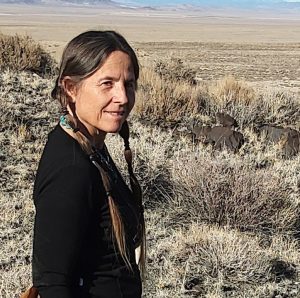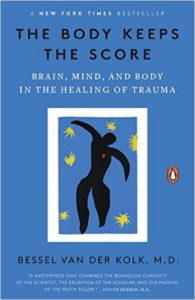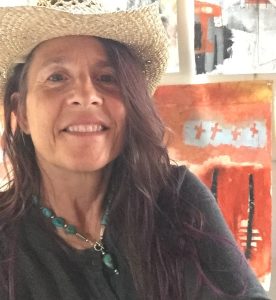
Astrid Larsen
Humanship. It’s an idea that has been tossed around the horse world for a few years now. During the Cayuse Collaborative Clinic, for instance, we added a bit of humanship by having a noontime session with Trish Lemke on how to be the best person for your horse. It was an introduction to thinking about our intentions and peace of mind whenever we’re around horses.
Now comes Astrid Larsen. Astrid is a college psychology professor in the Seattle area. We connected over the work I sometimes do around brain science, this article and this article in particular. Turns out we’re both pretty intrigued by how your past, which may include Big T trauma or little t trauma, can impact how you behave and interact with whoever, your horse, your friend, your partner, your coworker, and strangers. What we came to agree on, as we went back and forth via email and zoom, is that doing the work – which for many of us involves connecting with a therapist – is vital if you want healthy, positive outcomes. As Astrid says, you’ve got to do the work in order to do the work.
This is a far-reaching interview and one that includes discussions of self-awareness, trauma, including intergenerational trauma and the impact it can have — even on one’s DNA.
We really really hope this will spur some conversations and feedback from you. Hit the contact button and be in touch!
LINKS from Astrid Larsen:
Family dynamics influence the way we interact with other people as adults. Here’s an article from the Harvard Business Review about interactions at work.
Why do we hook up with controlling leaders? Deconstructing power dynamics in relationships. Read more
Early patterns affect the dynamics of shame in a controlling relationship. Read more
The difference between cycles of power and control, and equality. It’s a great idea to look at these two diagrams with an eye for the big picture. How do the systems you interact with (work, family, community, self) align with either one? Learn more
 Trauma effects hippocampus and memory. The hippocampus seems to shrink when bombarded with traumatic information. Check out the description of why a strong connection between two circuits leads to resilience, or bouncing back from the event or events. Learn more
Trauma effects hippocampus and memory. The hippocampus seems to shrink when bombarded with traumatic information. Check out the description of why a strong connection between two circuits leads to resilience, or bouncing back from the event or events. Learn more
The Max Planck Institute of Psychiatry initiated groundbreaking research on the genetic effects of Holocaust trauma on the children and grandchildren of people who had gone through the terrors inflicted on them. Here is an article on the research, from Genetic Engineering and Biotechnology News. Learn more
A study published in the journal Neuropsychopharmacology titled Potential of Environmental Enrichment to Prevent Transgenerational Effects of Paternal Trauma. Learn more
Courtney Giffins’ TED talk on epigenetics and influence of our genes
Seth Pollak, a scientist from the University of Wisconsin show genetic changes for children subjected to abuse and neglect. Learn more
Reclaiming resilience and plumping up the hippocampus. Watch video
Check out this website on recovering from trauma and developing resiliency.
Human’s anxiety levels affect domestic animals. Experiments with cortisol levels in dogs. Learn more and here’s more on kids, cortisol, and therapy horses. Learn more
Stress hormones cross the placenta, especially during long periods of stress. Stressed mama. stressed baby. Learn more
Thank you, Astrid and Maddy. Interesting discussion. Since I began being “into” horses later in life, and due to my proclivity for research, one of the first things I encountered was the differences between the way humans and horses experience the world. This included reading the thoughts of many in the horse world. Then, thanks to Maddy and the Best Horse Practices Summit, I was introduced to brain science — both horse and human. Since then, I flit here and there as a dive into the essence of behavior, horse and human, which is mostly about the brain (some physiology there too). This podcast fits right in and now I have another thought to ponder. The idea of linear vs. networked thinking. Aha! No wonder I’m on my own journey. I am completely a linear thinker.
Astrid spoke about men establishing the hierarchy. Since that is the way horses think and they are most comfortable when they know where they fit in the herd, I realized why it is often difficult for many of my female friends to grasp why horses act the way they do. I realized that those (mostly) women riders will have the same difficulty grasping how to interact with horses as they often do with their interactions with men. Horses are not verbal, not demonstrative, want certainty, and need to know where they stand. They have little to no brain space for networking to decide the solution. Just tell them, clearly, and be the leader in the hierarchy, and they will be your friend forever. I also know, now, why I prefer the company of horses over humans. As a linear thinker who eschews networking, I just want to lead and have the horse follow. My brain, my body, and my DNA tell them so and we stay calm as we face the work together. It was fun to have that puzzle piece settle into place. Thank you.
Also, a book I’m reading now crisscrosses with the discussion. Bear with me here, as it may seem difficult to imagine why the topics connect. “Cultish: The Language of Fanaticism,” uses cults as the structural subject but really becomes an examination of how our brains work and the impact that language has on our behavior. Clinics are not cults, you are thinking. However, it’s called “cultish” because the author, Amanda Montell, examines the behavior throughout society and not just in bona fide cults. This language tool, used by cultish leaders, and others who want to assert power and control, is a “thought-terminating cliche.” Coined by a psychiatrist in 1961, Montell notes “this term refers to catchphrases aimed at halting an argument from moving forward by discouraging critical thought.” She mentions that ever since she learned it, she sees evidence everywhere. Me too!
One such statement heard in horse clinics is “Don’t let yourself be ruled by fear.” It dismisses that you might be fearful, makes you afraid to even share your fear because you may be shamed, and actually may spin you even deeper into your layers of fear. I’m sorry to say that I’ve fallen into that trap. I don’t fear much, so have often had that terminating thought that someone should just move beyond their fear. That’s because I don’t intrinsically understand the experience. It’s through understanding horses that I now know more about how every brain on the planet works differently. Learning about how and why horses have and deal with fear has made me a better human. I’ve learned how best to stay in my own lane and work with my own thoughts and how to interact with a horse who thinks very much differently.
There is a lot to be learned from working with horses and diving deeper into the why of things. As always, I appreciate that these podcasts share new thoughts for me to ponder.
Great insights, Cathi. Thanks so much for writing.
I loved this!